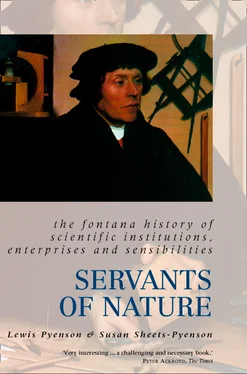SERVANTS OF NATURE
A History of Scientific Institutions, Enterprises and Sensibilities
LEWIS PYENSON
and
SUSAN SHEETS-PYENSON
Fourth Estate
An imprint of HarperCollins Publishers 1 London Bridge Street London SE1 9GF
www.harpercollins.co.uk
First published in Great Britain by
HarperCollins Publishers 1999
Copyright © Lewis Pyenson and Susan Sheets-Pyenson 1999
Lewis Pyenson and Susan Sheets-Pyenson have asserted the moral right to be identified as the authors of this work
All rights reserved under International and Pan-American Copyright Conventions. By payment of the required fees, you have been granted the non-exclusive, non-transferable right to access and read the text of this e-book on-screen. No part of this text may be reproduced, transmitted, downloaded, decompiled, reverse engineered, or stored in or introduced into any information storage and retrieval system, in any form or by any means, whether electronic or mechanical, now known or hereinafter invented, without the express written permission of HarperCollins e-books.
Source ISBN: 9780006862178
Ebook Edition © FEBRUARY 2016 ISBN 9780007394401
Version: 2016-01-08
HarperCollinsPublishers has made every reasonable effort to ensure that any picture content and written content in this ebook has been included or removed in accordance with the contractual and technological constraints in operation at the time of publication.
‘A considerable achievement.’ CASPAR HENDERSON, New Scientist
‘At best a heroic visionary, at worst a megalomaniac Frankenstein: either way triumphant individualism is taken for granted in the stereotypical scientist. So too is the disinterested purity of research conducted under lab conditions, all external considerations excluded like so many bacteria from a sterile vessel. Yet the reality has always been quite otherwise: the world refuses to stop at the laboratory door, and that has led to some of science’s greatest breakthroughs as well as its worst abuses. This highly readable, subtle and thought-provoking scientific history goes beyond whistle-blowing to consider more subtle and ultimately perhaps more interesting questions of how a changing institutional context has constrained the content and direction of we too unquestioningly take to be ‘pure’ science.’
Scotsman
COVER
TITLE PAGE
COPYRIGHT
PRAISE
PREFACE
INTRODUCTION: Science and Its Past
The discipline of history of science
Inspiration and method
The end of science
PART I: INSTITUTIONS
1 Teaching: Before the Scientific Revolution
The Mediterranean world
Eastern cultures
Islam
The Middle Ages
2 Teaching: From the Time of the Scientific Revolution
The Scientific Revolution
The rise of the German university
The German research university in context
Universities elsewhere
3 Sharing: Early Scientific Societies
Engines of the Scientific Revolution
The rise of the scientific correspondent
Eighteenth-century expansion
Nineteenth-century consolidation
The emergence of specialized societies
4 Watching: Observatories in the Middle East, China, Europe and America
The Islamic observatory
Chinese astronomy
Innovation in instruments
Time and prediction
Astronomy and related disciplines
5 Showing: Museums
The development of modern museums
The British Museum and the ‘new museum idea’
Museums in Europe and the United States
Colonial museums
Colonial and metropolitan museums: some comparisons
Descriptions of colonial museums
Museums in Canada, South America, and Australasia
6 Growing: Botanical Gardens and Zoos
The development of botanical gardens
Kew Gardens
The evolution of zoological gardens
The rise of public zoos
PART II: ENTERPRISES
7 Measuring: The Search for Precision
Measurement in antiquity
Syncretism and measuring instruments
Newtonian measurement
Timepieces
Standardization
The ideology of precision
Measurement and industrial progress
Absolute measurement and error analysis
The transformation of mechanical precision
Old programme, new effects
Philosophy and practice
Precision regnant
Precision and the human spirit
8 Reading: Books and the Spread of Ideas
From script to print
Facilitating the birth of modern science
The rise of the scientific journal
New forms for new audiences
Showing science: the art of illustration
9 Travelling: Discovery, Maps and Scientific Expeditions
Who discovered whom?
Travellers in antiquity
Maps
Progression of people and ideas in the Malay Archipelago
European expansion
A century of wonders
The new encyclopaedia
Classifying nature
The scientific expeditions
10 Counting: Statistics
The odds
Precision and numbers
Surveying and statistics
Terrestrial means
Statistics physical and social
Doctrine of certainty
Twentieth-century uncertainty
Average lives
The popular triumph of averages
11 Killing: Science and the Military
Gunpowder
The vocabulary of military science
French military builders
Naval stars
The star chart
Military mappers
Military weathermen
Applications and prestige
PART III: SENSIBILITIES
12 Participating: Beyond Scientific Societies
The rise of literary and philosophical societies
Associations for the advancement of science
The common scientist
Scientific clubs for everyone
The overseas extension of European models
Women in science
The example of Madame du Châtelet
Women elsewhere
13 Appropriating: Science in Nations Beyond Europe
Colonial scientific societies
Early colonial universities
Independent universities
The research university in the United States
Scientific migration
Australasia
Scientist missionaries in South America
Science at American universities
Science at Japanese universities
British India and Dutch Indonesia
14 Believing: Science and Religion
Science in the Counter-Reformation
The Merton thesis
The Webster thesis: millenarianism and science
The Enlightenment
Deism
Natural theology
The argument against Darwinian evolution
Twentieth-century developments
15 Knowing: Progressing and Proclaiming
Magic and science
Baconianism
Encyclopaedism
Materialism
Positivism
Читать дальше












